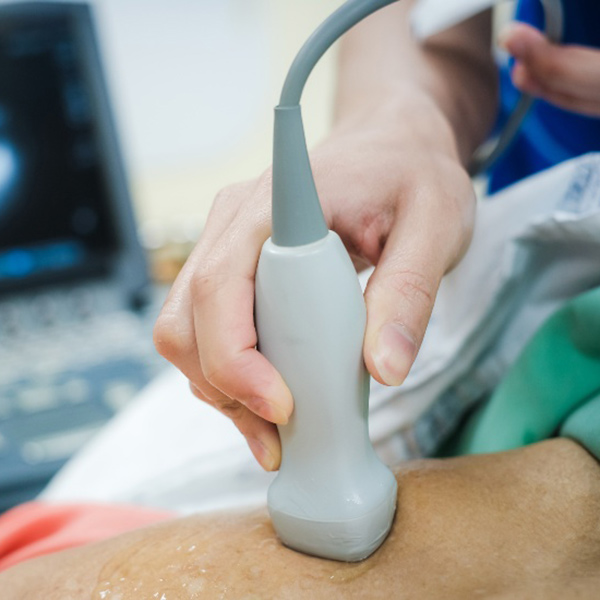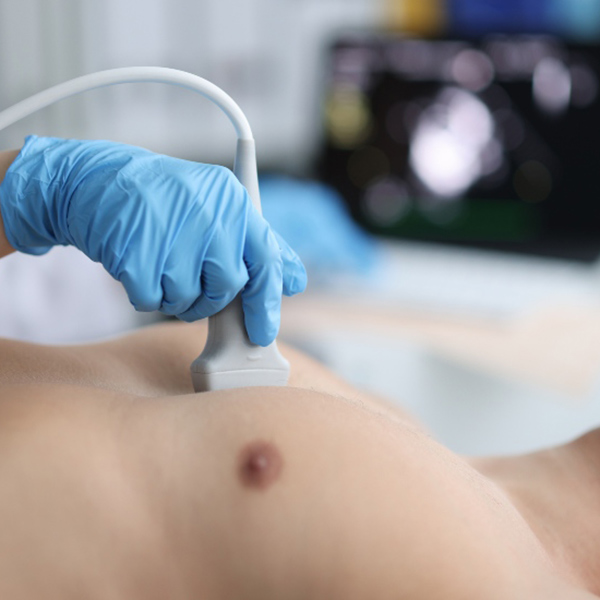Cardiac Solutions: Echocardiograms
We Provide Echocardiograms in Peoria, Sun City West, Glendale, Sun City, Litchfield, Avondale, Wickenburg, and Phoenix AZ
Your doctor or cardiologist may recommend that you undergo an echocardiogram to get a better sense of an issue or condition affecting your heart. Echocardiograms allow cardiologists to uncover problems within the heart’s chamber and valves. It can also be used to detect congenital heart defects that are present before birth. At Cardiac Solutions, we provide echocardiograms in Peoria, Sun City West, Glendale, Sun City, Litchfield, Avondale, Wickenburg, and Phoenix AZ.

What Is an Echocardiogram?
An echocardiogram utilizes sound waves to produce images of your heart and surrounding structures. It is a safe, non-invasive, and relatively quick medical test that allows your doctor or cardiologist to see the heart pumping blood and beating. Your doctor may recommend that you get an echocardiogram if it’s suspected that you have a heart issue like arrhythmia or murmur.
What Does an Echocardiogram Detect?
An echocardiogram test can detect problems in the valves or chambers of your heart, such as valves that are slow to open or stay open too long, or not long enough. An echocardiogram can also rule out cardiac problems. For instance, if you experience frequent shortness of breath and dizziness, your doctor may use an echocardiogram to rule out cardiac problems as the cause. An echocardiogram can also be done to determine if a fetus has a congenital heart defect.
The Types of Echocardiograms
There are four primary types of echocardiogram procedures:
During this type of echocardiogram procedure, the technician will use a device called a transducer to aim an ultrasound beam through your chest to your heart. The transducer records sound waves as they bounce around the heart, and a computer converts the sound wave’s echoes into an image on the screen.
This is a more complex type of echocardiogram that is recommended when your cardiologist needs more detailed images, or if the transthoracic echocardiogram was unsuccessful. During this echocardiogram procedure, your throat is numbed and a flexible tube containing a transducer is gently guided down your throat to your esophagus. The transducer records sound waves as they bounce around the heart, and a computer converts the sound wave’s echoes into an image on the screen.
Doppler techniques can be used in transthoracic and transesophageal echocardiograms. Doppler signals allow your cardiologist to measure the direction and speed of blood as it flows through your heart, identifying any blood flow problems and measuring the blood pressure in the arteries of your heart.
A stress echocardiogram may be recommended if your cardiologist suspects that your heart problems may be caused or exacerbated by exercise or physical activity. During a stress echocardiogram, ultrasound images are taken of your heart before and after you use a treadmill or stationary bike. If you can’t exercise, your doctor may inject a medication that increases your heart rate to that of someone who is exercising.
Echocardiogram Techniques
Your cardiologist takes images of your heart and valves during an echocardiogram using one or more different techniques:
- Two-dimensional ultrasound – this echocardiogram procedure produces 2D images on a computer screen.
- Three-dimensional ultrasound – this echocardiogram procedure shows various views of your heart, including how well it pumps blood and allows your heart to be seen from different angles.
- Doppler ultrasound – this echocardiogram procedure is used to show how fast your blood flows, and in what direction.
- Color Doppler ultrasound – this echocardiogram procedure shows your blood flow using different colors to highlight different directions of flow.
- Strain imaging – this echocardiogram procedure shows changes in the movement of your heart muscle and can provide early detection of some heart diseases.
- Contrast imaging – this type of echocardiogram uses contrast imaging to show the details of your heart.
What Happens During & After an Echocardiogram?
For a standard echocardiogram test, you will lie on an examination table or bed and a technician will place electrodes strategically across your body to detect and conduct your heart’s electrical currents.
The technician will use a transducer to record images of sound-wave echoes from your heart. The technician may direct you to breathe in a certain way or to roll onto your left side.
For a transesophageal echocardiogram, your throat will be numbed, and you will have the option of taking a sedative to help you relax. A tube containing the transducer will be guided down your throat and into your esophagus and positioned to obtain images of your heart.
The procedure may last up to one hour, and you may need to be monitored for one or two hours afterward if you’ve had a transesophageal echocardiogram. Most people can return to their normal routine after an echocardiogram. Your doctor or cardiologist will contact you once they have reviewed the results.

Why Choose Cardiac Solutions?
If you’re concerned you have a heart issue, you should visit a cardiologist as soon as possible for a diagnosis and treatment. At Cardiac Solutions, our team of experienced, compassionate cardiologists is committed to providing personalized, one-on-one care to each of our patients, so they feel comfortable and secure. We will talk you through your procedure and test results and design a treatment plan that works for you and your lifestyle.
Contact Cardiac Solutions for an Echocardiogram in Peoria, Sun City West, Glendale, Sun City, Litchfield, Avondale, Wickenburg, and Phoenix AZ
If you have been advised to get an echocardiogram, contact us at Cardiac Solutions. We have locations throughout AZ, including Peoria, Sun City West, Glendale, Sun City, Litchfield, Avondale, Wickenburg, and Phoenix. We specialize in diagnostic testing, clinical programs, surgical options, and cardiovascular treatments. To learn more, call us today or schedule an appointment online.
Our Reviews
Cardiac Solution has been very easy to deal with, the Doctors explain everything so | can understand, very professional and kind
The staff and Doctors show complete and concern for my heart health. They are always kind and caring, they listen to my questions and don't give the feeling of I need to hurry with my appointments. They always explain in turns that you can understand so that you can make the proper decision in your heart health.
Cardiac Solutions runs like a well oiled machine. Everyone works together for a great end result. Never a scheduling problem and the wait time from walkin to seeing the doctor is 10 to 15 min. You just can't beat that. Not a grouchy employee in the office. All seem to really like their job and it shows. Thank you for making my last visit a great experience.
Cardiac Solutions is staffed with the BEST...Docs, technologists, and all other personnel that | have come in contact with over the past 8+ years! | HIGHLY recommend them. So great to be treated by professionals who obviously love what they're doing
From the moment you walk in the door youre not by wonderful kind staff the entire experience from front office to Mid office to back office to your doctor visit his wonderful kind very well thought out an entire process is quick and flawless. They truly set the standard that other doctor offices should follow
